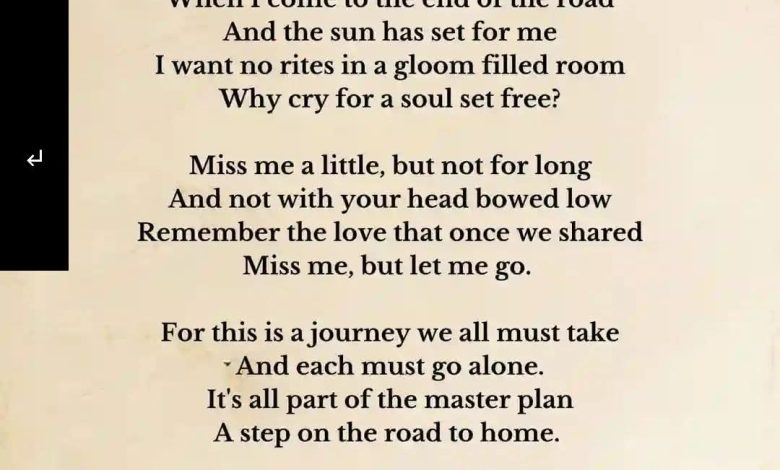Miss Me, But Let Me Go”: A Poetic Exploration of Grief and Acceptance

ADVERTISEMENT
Miss Me, But Let Me Go”: A Poetic Exploration of Grief and Acceptance
Introduction
The image you’ve shared features a poignant poem by Christina Rossetti titled “Miss Me, But Let Me Go.” This poem offers solace and comfort in the face of loss, reminding us that grief is a natural part of life and that acceptance can bring peace. In this article, we’ll delve into the depths of Rossetti’s words, exploring the themes of grief, acceptance, and remembrance, while also examining the poem’s structure, language, and cultural significance.
he Power of Remembrance
At its core, “Miss Me, But Let Me Go” is a poem about remembrance. The speaker acknowledges the pain of loss, but gently urges the reader not to dwell on it. Instead, they encourage us to remember the love and joy shared with the departed. This act of remembrance becomes a way to keep the spirit of the loved one alive within us.
Rossetti’s choice of language is both delicate and powerful. She uses simple yet evocative words to convey complex emotions. The image of the sun setting represents the end of life’s journey, while the phrase “a soul set free” suggests a sense of liberation and peace.
The Journey of Grief
The poem also touches upon the journey of grief, acknowledging that it is a personal and solitary experience. The line “each must go alone” emphasizes the individual nature of death, reminding us that it is an inevitable part of life. However, Rossetti’s words are not meant to instill fear or sadness. Instead, they offer a sense of acceptance, suggesting that death is simply “a step on the road to home.
Finding Comfort in Love and Friendship
In the final stanza, Rossetti reminds us of the importance of love and friendship in overcoming grief. She encourages the reader to seek comfort in the company of loved ones, to “laugh at all the things we used to do,” and to cherish the memories shared. This emphasis on love and laughter serves as a powerful antidote to sorrow, reminding us that even in the face of loss, life and joy continue.
ADVERTISEMENT
The Image: A Poetic Tribute
The image of the poem itself is a testament to its enduring power. The elegant font and the delicate floral embellishments create a sense of tranquility and beauty, reflecting the poem’s message of acceptance and peace. The inclusion of Rossetti’s name and the title of the poem further emphasizes the personal nature of the work, inviting the reader to connect with the poet’s own experiences and emotions.
Conclusion
“Miss Me, But Let Me Go” is a timeless poem that offers comfort and solace in the face of loss. Through its powerful language, evocative imagery, and emphasis on remembrance, acceptance, and love, the poem reminds us that grief is a natural part of life and that healing is possible. The image of the poem serves as a beautiful tribute to Rossetti’s words, inviting us to reflect on our own experiences with loss and to find solace in the enduring power of poetry.



